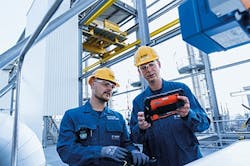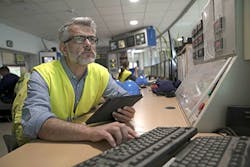The COVID-19 pandemic is spurring changes in the way operating companies and vendors make the most of employees’ skills and knowledge. Firms such as BASF, Rockwell Automation and AspenTech now are leaning heavily on the latest technologies.
“Even before the COVID-19 pandemic, training and knowledge management for managers and employees were revised to make them fit for the challenges of digital transformation and a modern working world. On the one hand, new and flexible forms of work are associated with a change in culture. On the other, we are empowering managers and employees in the use of new tools,” explains a spokeswoman for BASF, Ludwigshafen, Germany.
A key element of the strategy is retaining knowledge and experience, especially when an employee transfers to another company unit or retires. Hand-in-hand with this is the need to ensure efficient and safe operation of BASF’s plants, execution of maintenance work, and implementation of organizational issues in the long term (Figure 1).
Figure 1. Major chemical maker is fostering greater use of digital tools and providing more online resources. Source: BASF.
“For some time now, this has not been possible without the use of digital tools. For example, collaboration tools such as Sharepoint and WebEx are used for working together. Some units already use videos to document knowledge, and moderated knowledge transfers take place virtually wherever possible,” adds the spokeswoman.
To best illustrate how to use these tools for knowledge transfer, BASF has set up a platform called “Digitalization & Me” on its intranet. Here, employees can find, among other things, numerous online training courses, videos and articles on further education. The company also uses LinkedIn Learning to communicate digital content.
“The COVID-19 pandemic has strengthened and accelerated this process. At the Ludwigshafen site, further training courses were converted to digital learning solutions in the shortest possible time, where possible, so that the planned measures could be implemented as far as possible,” notes the spokeswoman.
BASF also has launched a digital series specifically for managers called “Leading at a Distance” that focuses on “leading virtually.” The aim is to support managers during the particularly challenging times of the COVID-19 pandemic and provide them with the necessary tools for virtual leadership through exchanges with experts and others who might be working off site or getting close to retirement.
A new global campaign entitled “Making remote work, work!” highlights all aspects of virtual collaboration as well as content on virtual leadership.
Onboarding events for new managers, which normally are held in person, have gone in recent months to an online format, and will continue that way for the time being. Similarly, the master craftsman qualification for production and technology employees has been converted to virtual or hybrid training. Part of their work involves gaining knowledge and carrying out assessments made available via a learning portal while the rest entails working face-to-face in small, socially distanced teams.
The Value Of Extended Reality
Rockwell Automation today is having more conversations with customers in the chemicals and other sectors about knowledge retention and transfer, according to Ramon Farach, a Nashville, Tenn.-based global industry technical consultant for the company, which has a wide automation and digitalization portfolio.
“Workforce turnover has been an ongoing problem in the chemical industry, and COVID-19 has only exacerbated the issue. Physical restrictions made in-person learning especially difficult as companies must limit the amount of people that are allowed in a control room or facility at the same time,” he says.
On top of that, companies also must deal with unexpected staff absences if someone becomes sick or comes in close contact with COVID-19.
“When these absences are among experienced workers, it creates an unexpected knowledge gap for the less-experienced workers remaining on site,” adds Farach.
Figure 2. The pandemic has dramatically decreased on-site visits by subject matter experts to troubleshoot problems. Source: Rockwell Automation.
As a consequence, onboarding of new talent has become a particularly big headache for companies. “In normal times, new operators would have the opportunity to learn procedures and job tasks face-to-face with experienced employees, which is very helpful for their development and hands-on learning in an operating facility,” he notes.
Troubleshooting problems also has become difficult for process or operations support engineers. For the past year or more, subject matter experts (SMEs) who ordinarily would visit plants to provide root cause analysis or troubleshoot complex issues (Figure 2) often haven’t been able to address issues in person. Instead, they have had to find other ways to “see” and accurately support major problems, explains Farach.
Other tasks similarly affected by COVID-19 are processes such as hazard and risk analyses and safety assessments. These normally would take place in person and consist of a detailed walk-through of the plant.
“Now, personnel have to rely on technology, so they are performed through a variety of extended reality (XR) technologies to ensure accuracy,” says Farach. XR is a catch-all term that includes augmented reality (AR), virtual reality (VR) and mixed reality (MR), he notes.
“These are not necessarily new tools but they have evolved and become more pervasive in the past year. Within this umbrella, there are a variety of technologies that can help more-experienced operations personnel pass down their tacit knowledge.”
One of the easiest technologies for capturing knowledge is AR eyewear. Experts can wear the eyewear while performing a technical task or operating procedure, recording the full experience hands-free. After this, the video can be edited and voiced-over to explain the task step-by-step. It’s a tool that helps extract knowledge right from the source to equip new personnel with the accurate, easy-to-follow information they need, Farach stresses.
AR-based remote assistance is another technology that’s been especially helpful during the pandemic when meeting in person is difficult. It combines AR collaboration tools with real-time video communications to connect engineers with SMEs so all can see the issue in detail from the same perspective and work together to find an answer. “Our partnership with PTC has helped us provide these technologies and solutions to customers at a time where they are adjusting to a new way of work,” adds Farach.
Rockwell Automation is discussing these technologies with several of its customers. One application being assessed with a large specialty chemical customer, which will apply in other segments of the chemical industry, is the use of PTC’s Vuforia Chalk to provide an effective alternative to bringing resources into a plant because of pandemic-related restrictions. Vuforia Chalk combines advanced AR collaboration tools with real-time video communications to connect a field technician with an expert so they both can see and discuss the situation at hand. Potential benefits include streamlining troubleshooting efforts as well as coordinating and sharing insights relating to project scope definition.
The increased use of XR technologies will only speed up the transition from paper to digital records, believes Farach. “Rather than using PDFs or lengthy documents, we need — and have come to expect — this knowledge to be readily available and accessible through virtual platforms. We have already seen this begin and expect to see most procedural documentation become digital in the long-term.”
In addition, chemical companies facing pressures to reduce operating costs in the face of margin erosion are realizing significant cost savings using XR to provide remote support and knowledge transfer, he notes.
“We believe these new ways of working will become the new normal and continue to play a significant role in the way our customers do business well after the pandemic has finally passed. COVID-19 has shown us just how important it is to be connected in this industry. If this would have happened 20 years ago, it would have been extremely challenging for businesses to survive. Using the right technologies to stay connected is what made it possible for us — and our customers — to keep going during this difficult time,” Farach concludes.
Greater Focus On Retaining Knowledge
“The impact of retirements has never really been an attention-grabber, rather an undercurrent that almost always comes up in conversations with customers,” explains Laura Stridiron, senior product marketing manager at software company AspenTech, Houston. “However, there’s never really been any consideration of the numbers involved with the capture and use of tribal knowledge because it’s very hard to assign a value to someone who is about to retire unless you have to double shift for over-the-shoulder learning, for example. I never thought it would take a pandemic to bring these issues right to the surface.”
The pandemic has stopped people being able to cross-pollinate ideas in their usual team settings, she notes, adding that now they are asking questions such as: “How is this going to impact our health and safety at work?” and “What do we do if the expert we need is working from home?”
AspenTech has seen some customers move to dedicated work teams due to COVID-19, meaning no intermingling. While remote support still is available, knowledge transfer via phone and with intermittent contact likely is difficult or non-existent.
“Customers who had digitalization efforts underway are realizing that it is not about automating tasks but about ensuring consistent action and decision capabilities and it has brought a new importance to those projects,” she explains.
AspenTech has a two-pronged approach to these challenges. The first involves looking at historical data and applying learnings from those data to the future. This is why it’s important for the company’s technologies to encompass all the process data, Stridiron notes.
So, for example, an impending compressor failure is never a problem in isolation. Other events occur elsewhere in the facility that likely never get correlated back to that compressor issue. At the same time, veteran staff’s experiences often have led to their developing their own approaches to tackle such difficulties.
“So, it’s a case of making the subjective more objective and trying to put this knowledge and expertise into the heads of process experts,” she explains.
The second prong of AspenTech’s approach is how to better and more impactfully learn going forward. The idea is to enable broad and ready access to a particular situation and share learnings across the organization.
Here, the company’s Event Analytics technology is designed to provide an investigation tool for operators to more quickly assess “bumps in the night” that they either may have ignored or had to seek help with. It allows operators to quantify if the issue is something that occurs frequently and what else was happening at the same time. “They are then able to indicate the corrective action required and monitor for future occurrences, giving other shifts as well as future operators better guidance on actions to take,” adds Stridiron.
Being able to capture, retain and then apply such knowledge in a useful way can have profound effects on the bottom line, too. Stridiron cites a project at a chemical company that involved teasing out the “muscle memory” of two and half years’ worth of data and then overlaying it with the knowledge of existing engineers on the site. The result was a $1.5-million/y saving in energy consumption by the company’s furnaces.
In another example, a polymer plant experienced a sudden drop in recovery of unreacted raw material, which was costing nearly $100,000/week in losses. After trying several methods of analysis with no success, the plant turned to AspenTech’s ProMV to analyze the process data. It found that temperature stability was the key factor at play. The company then realized the problem had been known about a decade earlier. However, no current employees on the site recollected that.
“Memory and vague work orders cannot be the source of root cause identification. ProMV saved $5 million/y in this case and, with monitoring and controls, similar issues will be proactively identified in the future before profits suffer,” Stridiron concludes.
Seán Ottewell is Chemical Processing's editor at large. You can email him at [email protected].





